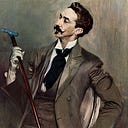Modiano, Hartman, and the Quest for Archival Justice
Writing As Preservation
A decade ago, an author with modest fame in his country but relative obscurity elsewhere won the Nobel Prize. Patrick Modiano received this honor for his literature on the Holocaust in both fiction and nonfiction. The award’s announcement ambiguously praises him for his deployment of “memory,” so one might be excused for thinking Modiano saw the Holocaust unfold with his own eyes. He was, however, born relatively late for that, in 1945. So, without this firsthand experience, how did he become one of the leading voices in Holocaust literature? As a Jewish man, Modiano was surrounded by the echoes of this horrible time period in history. His own parents witnessed as Paris was occupied by the German army, and as hundreds of people in their communities were harassed, expelled from the city, and killed. Those memories certainly feature in his 1997 book Dora Bruder. Yet the heart of the book are not Modiano’s brief ventures into eyewitness accounts by his parents and the intergenerational trauma resulting from this time, but rather his search for records documenting the life of an ordinary Jewish teenager named Dora Bruder. By life, Modiano meant more than the traumatic unfolding of the Holocaust. He sought to unearth a fully-fleshed portrait of Dora — what she liked to do in her free time, where she went to school, who were her friends, and what her relationship with her parents was like. The act of preserving this information is decidedly political — it centers an individual whose life was deemed undesirable by the Nazis. In Dora Bruder, literary and historical writing coalesce to rescue the memory of somebody who was a of millions of victims of systemic extermination. Modiano makes sure that her individuality does not dissipate even as we consider historical events in terms of Great Events rather than family histories.
As I read Dora Bruder, I couldn’t help but notice similarities with the writings of Black American historian Saidiya Hartman. In Wayward Lives, Beautiful Experiments (2019), Hartman uses her expertise in historical studies to craft well-rounded portraits of Black women in Philadelphia and New York City in the early twentieth-century. For a scholarly audience that is slowly opening up to modes of knowledge production other than empirical work, Wayward Lives may come across as experimental — it is not the typical monograph published by a traditional university press. Such works of history scholarship make sense for communities whose historical records were always intact for anybody to see. For a disenfranchised group like these urban Black women, records are not always as easy to obtain. Knowledge about the past often travels orally through the stories of relatives. While it is true that the risk of imperfect documentation of the past remains a concern with Hartman’s approach, the same is true for conventional archival research. Humans make mistakes and misinterpret tangible objects as much as they do intangible stories. Their subjectivities are not masks that they can simply take off, but rather something that permeates every aspect of their lives.
Dora Bruder was born around the same time as Saidiya Hartman’s subjects lived to the fullest in the urban Northeast. A giant ocean separating each other’s countries and sociopolitical turmoil means that it is unlikely that they ever crossed paths in any way while they were alive. Today, they cross each other’s paths in this brief piece of writing. Modiano and Hartman engaged in similar practices in order to grant the people they write about justice. While these historical characters may not be able to tell their stories in their own terms, they have some passionate interlocutors in Modiano and Hartman, two writers who understand the stakes of preserving vignettes of individuals who are not unlike any of us, with hopes and aspirations, flaws and virtues, and a drive to live.
